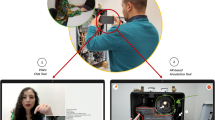Abstract
Prior research has shown that computer-mediated communication introduces barriers to effective non-verbal communication. This creates potential challenges as workers increasingly collaborate remotely in a post-pandemic world. To further investigate these barriers, we conducted an exploratory study with five remote workers featuring qualitative user testing of concepts designed to facilitate non-verbal feedback using multi-modal AI technologies. Prior to the study, a team of UX designers created low-fidelity concept prototypes using different variables important for participant feedback (that is, modality, type, user control, visibility, granularity, timing, and categories). Using these prototypes, we conducted semi-structured interviews (90-min long) with scenario-based questions. The results showed that the participants perceived the prototypes for multi-modal feedback positively, especially for the multi-tasking scenarios. However, this perception differed based on different roles: Presenters versus listeners. In general, the participants indicated that the presenters would be more interested in feedback than the listeners, as long as that feedback was uncluttered and actionable. By contrast, when commenting as listeners (that is, as individuals whose feedback would be monitored), the participants expressed concerns over the accuracy of AI models, a sense of being monitored (privacy concerns), and potential social risks to provide uncomfortable feedback. As a future work, we plan to iterate on the current prototypes to address these concerns, and deploy a larger study with refined and more functional prototypes.
Access this chapter
Tax calculation will be finalised at checkout
Purchases are for personal use only
Similar content being viewed by others
References
Cao, H., et al.: Large scale analysis of multitasking behavior during remote meetings. In: Proceedings of the CHI Conference on Human Factors in Computing Systems 2021, pp. 1–13. ACM Press, Washington DC, USA (2021)
Cool, C., Fish, R.S., Kraut, R.E., Lowery, C.M.: Iterative design of video communication systems. In: Proceedings of the ACM Conference on Computer-Supported Cooperative Work–CSCW 1992, pp. 25–32. ACM Press, Toronto, Ontario, Canada (1992)
Doran, D., Schulz, S., Besold, T.R.: What does explainable AI really mean? A new conceptualization of perspectives. arXiv preprint arXiv:1710.00794 (2017)
Koehne, B., Shih, P.C., Olson, J.S.: Remote and alone: coping with being the remote member on the team. In: Proceedings of the ACM Conference on Computer Supported Cooperative Work–CSCW 2012. ACM Press, Seattle, Washington, USA (2012)
Merriam, S.B.: Case Study Research in Education: A Qualitative Approach. Jossey-Bass (1991)
Murali, P., Hernandez, J., McDuff, D., Rowan, K., Suh, J., Czerwinski, M.: AffectiveSpotlight: facilitating the communication of affective responses from audience members during online presentations. In: Proceedings of the CHI Conference on Human Factors in Computing Systems 2021, ACM Press, Yokohama, Japan (2021)
Pinatti de Carvalho, A.F., Ciolfi, L., Gray, B.: Detailing a spectrum of motivational forces shaping nomadic practices. In: Proceedings of the ACM Conference on Computer Supported Cooperative Work and Social Computing 2017, pp. 962–77. ACM Press, Portland, Oregon, USA (2017)
Saatçi, B., Akyüz, K., Rintel, S., Klokmose, C.N.: (Re)Configuring hybrid meetings: moving from user-centered design to meeting-centered design. Comput. Supp. Cooper. Work (CSCW) 29(6), 769–794 (2020). https://doi.org/10.1007/s10606-020-09385-x
Thomas, S.L., Chierichetti, R., Sherry, J.: Intel® Labs researches the future of remote collaboration (2021). https://www.linkedin.com/pulse/intel-labs-researches-future-remote-collaboration-suzanne-thomas
Wang, D., et al.: From human-human collaboration to Human-AI collaboration: designing AI systems that can work together with people. In: Extended abstracts of the CHI Conference on Human Factors in Computing Systems 2020, pp. 1–6 (2020)
Wasson, C.: Being in two spaces at once. J. Linguist. Anthropol. 16(1), 103–130 (2006). https://doi.org/10.1525/jlin.2006.16.1.103
Williamson, S, Pearce, A., Dickinson, H., Weeratunga, V., Bucknall, F.: Future of work literature review: emerging trends and issues (2021). https://www.unsw.adfa.edu.au/sites/default/files/documents/Future_of_Work_Literature_Review.pdf
Acknowledgements
We would like to thank the Remote Collaboration project team at Intel Labs for their support in undertaking this study while in the middle of a pandemic. We dedicate this paper to the memory of our beloved colleague, Suzanne Thomas, whose research leadership and collegiality inspired and informed us during this project.
Author information
Authors and Affiliations
Corresponding author
Editor information
Editors and Affiliations
Rights and permissions
Copyright information
© 2022 The Author(s), under exclusive license to Springer Nature Switzerland AG
About this paper
Cite this paper
Aslan, S., Chierichetti, R., Sherry, J., Nachman, L. (2022). An Exploratory Qualitative Investigation: Multi-modal AI Technology Concepts for Non-verbal Feedback During Remote Work Meetings. In: Stephanidis, C., Antona, M., Ntoa, S. (eds) HCI International 2022 Posters. HCII 2022. Communications in Computer and Information Science, vol 1580. Springer, Cham. https://doi.org/10.1007/978-3-031-06417-3_53
Download citation
DOI: https://doi.org/10.1007/978-3-031-06417-3_53
Published:
Publisher Name: Springer, Cham
Print ISBN: 978-3-031-06416-6
Online ISBN: 978-3-031-06417-3
eBook Packages: Computer ScienceComputer Science (R0)




